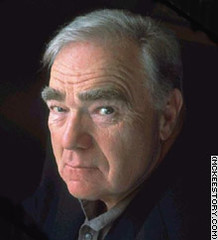Robert McKee, the well known instructor of screenwriting, has much to say on this subject. And I agree with him, so I will quote him.
 "To retreat behind the notion that the audience simply wants to dump its troubles at the door and escape reality is a cowardly abandonment of the artist's responsibility. Story isn't a flight from reality but a vehicle that carries us on our search for reality, our best effort to make sense out of the anarchy of existence."
"To retreat behind the notion that the audience simply wants to dump its troubles at the door and escape reality is a cowardly abandonment of the artist's responsibility. Story isn't a flight from reality but a vehicle that carries us on our search for reality, our best effort to make sense out of the anarchy of existence."I love stories. I love to imagine myself as a hero. I love to get angry at well formed villians. I love that I can laugh and cry and roll my eyes at idiocy. Why, though? Because the stories resonate with my life experience. And often resonate with the life experience that I can no longer remember. Jesus taught in parables so that each person could take meaning from it on the level of understanding he had acheived. Reading a book or watching a movie is never the same twice.
Robert McKee said that humans are constantly trying to understand our exsistence. We have done it through philosophy, science, religion and art. "But today who reads Hegel and Kant without an exam to pass? Science, once the reat explicator, garbles life with complexity and perplexity. Who can listen without cynicism to economists, sociologists, politicians? Religion, for many, has become an empty ritual that masks hypocrisy. As our faith in traditional ideologies diminishes, we turn to the source we still believe in: the art of story...Our appetite for story is a reflection of the profound human need to grasp the patterns of living, not merely as an intellectual exercise, but within a very personal, emotional experience. In the words of playwright Jean Anouilh, 'Fiction gives life its form.'"
So am I not entertained when I go to the movies? Do I approach each work of fiction as a tool to comprehend the complexity and chaos of life? No, of course not. That is why stories are so powerful. They are entertaining. Maybe I do escape my life in the midst of the experience. But they stay with me. I accept and reject their ideologies. I change my perspective after having seen or read some stories. Over time, much of my character is shaped as a result of assimilating stories.
It is too bad some squander this awesome stewardship by creating empty, vapid works. But, on the other hand, perhaps what is empty and vapid to one could be very meaningful to another.
5 comments:
I wanted to add the line that follows, but every time I tried to re publish, Blogger said there were errors.. Blah!
I wanted to add: But, on the other hand, what is empty and vapid to one, could be very meaningful to another.
I finished that Lolita in Tehran, and it taught me three things: 1. I am dying for ice cream swimming in coffee
2. I should reread Nabokov
3. Persians have a lot of time on their hands to protest. I can barely watch murder she wrote and eat Rolos before sundown.
(Interestingly, I learned the same things from Murder She Wrote...)
Is it valid to also love the sheer vapid entertainment of mindless books? I'd so much rather read a mindless book than watch a dumb movie. (Except for VinDiesel and The Rock.)
I've not read any Nabokov, but she certainly makes it sound intereting. I'm only on page 60 of Reading Lolita. I've heard the last is the best.
I have definitely read my share of vapid books and seen my share vapid movies. And perhaps more often than I'd like to admit, I've wallowed in the guilty pleasure they offer.
It's called intellectual snobbery and I've got a bad case of it.
I'm afraid that after watching Adaptation, it's hard to take McKee seriously.
You have a point. But still, his book is very good. And I'll prove it...once I finish that screenplay!
Post a Comment